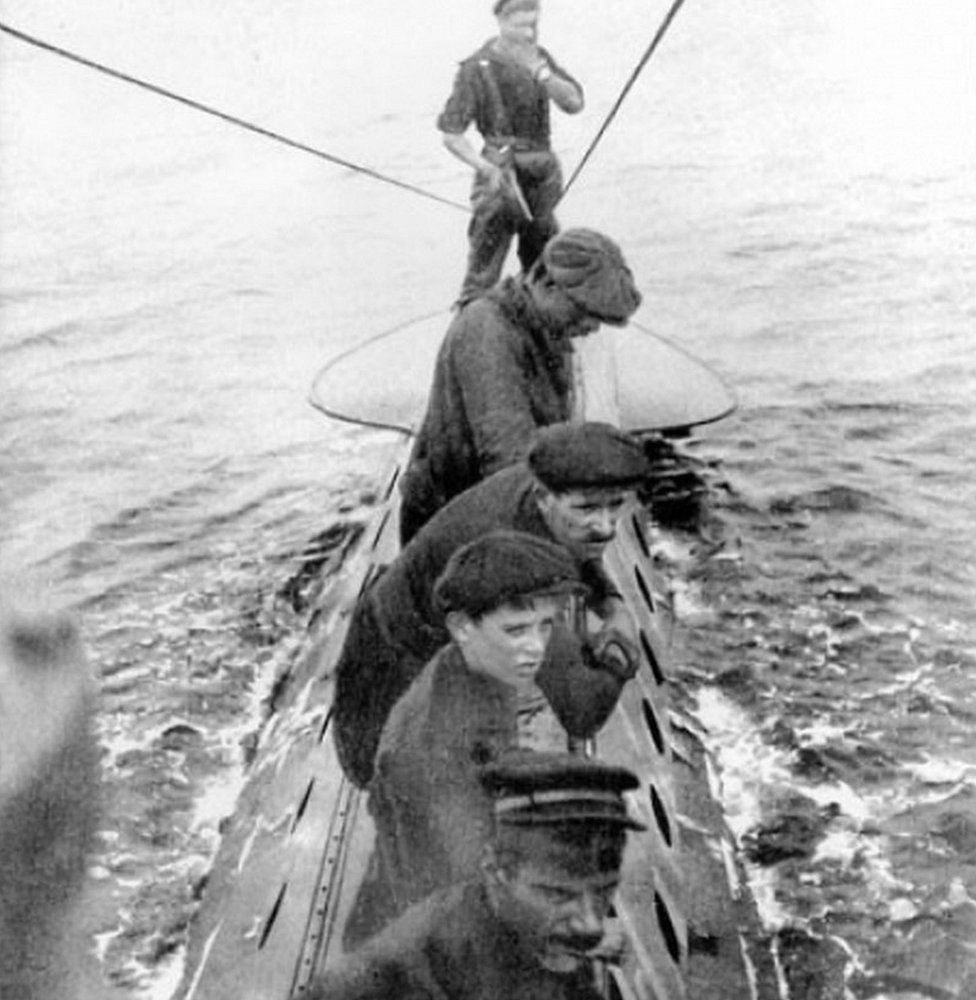WWI: The 'gentlemanly massacre' of Scarborough's fishing fleet
- Published

Captured fishermen were pictured being held at gunpoint on the U-57 submarine
World War One, with its brutal trench fighting and poison gas attacks, was not known for its chivalry. Yet 100 years ago, 19 fishing boats were sunk without the loss of a single life, due to the compassionate actions of a German U-boat crew.
In September 1916, a group of fishing steamers were about 20 miles north-east of Scarborough when U-57 surfaced under the cover of darkness.
The waters had been declared a warzone by Germany, with nine trawler crew members dying in a torpedo attack a year earlier.
Eleven of Scarborough's 16 steamers had their nets down when the German commanding officer (CO) launched what he called a "massacre of ships", but he ordered the evacuation of each trawler before it was sunk - sparing the lives of 126 men.
"In a few cases like this one there was respect and chivalry, but that didn't always happen," said Charlotte Czyzyk, a researcher at Imperial War Museum North.
"Merchant shipping, with its food and supplies, was a major target."
A Scarborough steamer called Otter was among the vessels sunk by the German submarine
According to the log of German CO Carl-Siegfried Ritter von Georg, he used one of the steamers as a holding area "to assemble the crews" while the boats were sunk one by one.
Steamers from Whitby and Grimsby were also lost in the attack, with 19 boats sunk in total.
An English translation of the log reads: "In the event of the slightest reluctance to follow a command, the U-boat - which would be following closely behind - would make use of its armaments."
Arthur Godfrey, an author who specialises in the Yorkshire coastline, said the aim of the sinkings was "to strike fear into the trawlermen" who had to continue with their work despite the obvious dangers.
He said: "The trawler crews were brought alongside the U-boat, when the skipper would tell them how he proposed to sink their ship, either by the head or by the stern as the fancy took him."
All were sunk by gunfire apart from the steamer Nil Desperandum, which had a bomb placed in the engine room.
Divers explore the wreck of the fishing boat Otter near Scarborough, which was sunk 100 years ago (Video by Andy Jackson)
"The U-boat was cruising and stopping and sinking any British registered ship," said maritime researcher Gilbert Mayes.
"At that stage in the war there was a more gentlemanly approach to warfare and it was the hardware that was destroyed, not the personnel."
George Westwood, former vice chair of the Scarborough Maritime Heritage Centre, said a British patrol vessel approached but the German U-boat hid behind one of the trawlers and it passed by.
"Ritter von Georg stopped a neutral Norwegian steamer and put 126 fishermen on board, with the Scarborough men all landed safely in South Shields the following morning," he said.
The fishing fleet was targeted about 20 miles north east of Scarborough in the North Sea
Despite the seriousness of the situation, Mr Westwood said several funny stories were shared by the men when they made it back to Scarborough.
A fisherman was offered a cigarette by a German submariner, Mr Westwood said, but when he "pulled out a box of England's Glory matches" and offered the German a light, the guard took the cigarette back and "threw the matchbox overboard".
The sinkings meant the seaside town, which had already suffered during the bombardment of 1914, had a bare-bones fishing fleet and many men were left looking for employment.
The Yorkshire Evening Post headlined it "another severe blow for Scarborough".
Its report read: "Scarborough's loss is severe, for the fishing industry has brought a lot of money into the town at a time when it was greatly needed."
The wrecks of the boats lie close to each other and most remain in fairly good condition.
Andy Jackson, an underwater cameraman who has visited several of the wrecks, said: "The site is really unusual as the wrecks are grouped together in a relatively small area where the U-boat captain had rounded them up.
"They are also unusual wrecks in that they are all sat the right way up on the seabed and are very intact - I am more used to seeing the devastation caused by a mine or a torpedo where ships are broken and twisted beyond recognition."
Diver Andy Jackson found Otter's bell, which has since been taken to the surface and restored
He added: "They sit there out of sight as a monument to the struggle to feed our nation in a bitter and prolonged war that was in part staged along our east coast. Remember Scarborough."
- Published24 February 2014